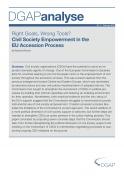Civil society organizations have the potential to serve as important domestic agents of change. One of the European Commission’s declared aims for countries aspiring to join the European Union is the empowerment of civil society throughout the accession process. This was a lesson learned from the previous enlargement toward Central and Eastern Europe, which was dominated by executive actors and saw only patchy implementation of adopted reforms.
The Commission has sought to strengthen the involvement of CSOs in political processes by building their internal capacities and fostering an enabling environment for their operation. Nonetheless, both empirical evidence and the very setup of the EU’s support suggest that the Commission struggles to move beyond a purely instrumental use of civil society empowerment. Croatia’s accession process illustrates the limitations of the Commission’s current approach. The recent addition of a more political dimension of civil society support is welcome, but further steps are needed to strengthen CSOs as active partners in the policy-making process. This paper concludes by proposing seven concrete steps that the Commission should take, from further strengthening the political dimension of civil society support and insisting on the involvement of CSOs in membership negotiating processes to supporting ongoing CSO initiatives on the ground.
